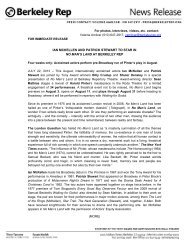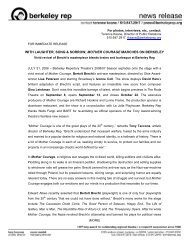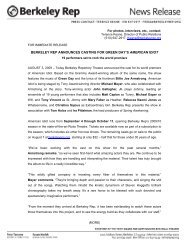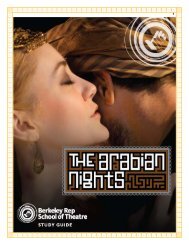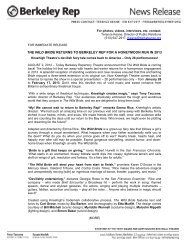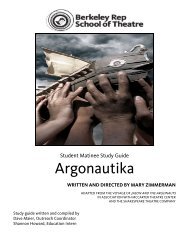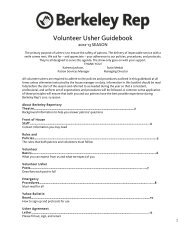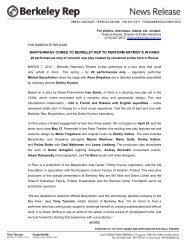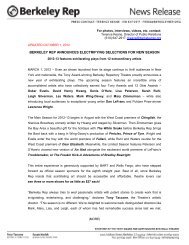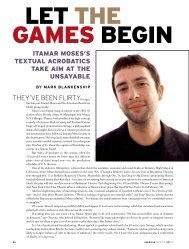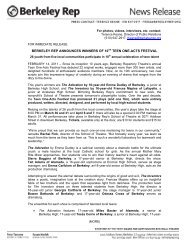the berkeley rep magazine - Berkeley Repertory Theatre
the berkeley rep magazine - Berkeley Repertory Theatre
the berkeley rep magazine - Berkeley Repertory Theatre
You also want an ePaper? Increase the reach of your titles
YUMPU automatically turns print PDFs into web optimized ePapers that Google loves.
Muses<br />
it is a central mark of our humanity that we work so hard to<br />
remember what has happened to us as individuals and as a species. In ancient times, storytellers<br />
encoded information in oral tales to share with future generations, and philosophers used<br />
<strong>the</strong>ir keen powers of observation to craft ingenious mnemonic systems. More recently, scientists<br />
have tirelessly studied behavior, psychology, and <strong>the</strong> physical landscapes of our brains to better<br />
understand how we remember and why. As we’ve evolved from singing around <strong>the</strong> campfire<br />
to cloud storage, <strong>the</strong> ideas we wish to remember and <strong>the</strong> technology used to record <strong>the</strong>m have<br />
grown evermore complex. While possible to document events in a detached and clinical fashion,<br />
<strong>the</strong> meaning only emerges for us when we can tease out a narrative from tangles of data. The<br />
desire to tell a story about what has happened to us remains <strong>the</strong> same. We want our wisdom to<br />
endure and to improve <strong>the</strong> lives of our children’s children, and above all, we want <strong>the</strong>m to know<br />
and understand us, so we tell a story.<br />
Linguist Walter J. Ong has done extensive research into oral cultures all over <strong>the</strong> world. He<br />
divides societies into two main categories: societies that have had no exposure to written language,<br />
and groups that have incorporated writing into <strong>the</strong>ir social fabric. In <strong>the</strong> wake of globalization,<br />
very few communities have had no contact with <strong>the</strong> printed word, but some cultures have a<br />
higher “oral residue” than o<strong>the</strong>rs. The ancient Greeks in <strong>the</strong> days of Socrates and Herodotus lived<br />
in a society with a significant oral residue. Though a Greek alphabet had existed for some time<br />
and <strong>the</strong> Greeks had contact with numerous o<strong>the</strong>r literary cultures, written documents had not<br />
yet been fully embraced ei<strong>the</strong>r as an art form or as <strong>the</strong> most effective means of recordkeeping.<br />
Plato records a fascinating story from Socrates about <strong>the</strong> Egyptian god Theuth’s (Thoth) gift of<br />
letters to <strong>the</strong> king Thamus:<br />
‘This invention, 0 king,’<br />
said Theuth, ‘will make <strong>the</strong> Egyptians wiser and will improve <strong>the</strong>ir<br />
memories; for it is an elixir of memory and wisdom that I have discovered.’<br />
But Thamus <strong>rep</strong>lied, ‘Most ingenious Theuth…. this invention will produce forgetfulness<br />
in <strong>the</strong> minds of those who learn to use it, because <strong>the</strong>y will not<br />
practice <strong>the</strong>ir memory. Their trust in writing, produced by external<br />
characters which are not part of <strong>the</strong>mselves will discourage <strong>the</strong> use<br />
of <strong>the</strong>ir own memory within <strong>the</strong>m. You have invented an elixir<br />
not of memory but of reminding; and you offer your pupils <strong>the</strong><br />
appearance of wisdom, not true wisdom.’<br />
In o<strong>the</strong>r words, writing is a prop and a poor substitute for actually learning something.<br />
Socrates goes on to assert that it is an impersonal and incomplete way of connecting or acquiring<br />
2012–13 · ISSUE 2 · <strong>the</strong> <strong>berkeley</strong> <strong>rep</strong> <strong>magazine</strong> · 17



